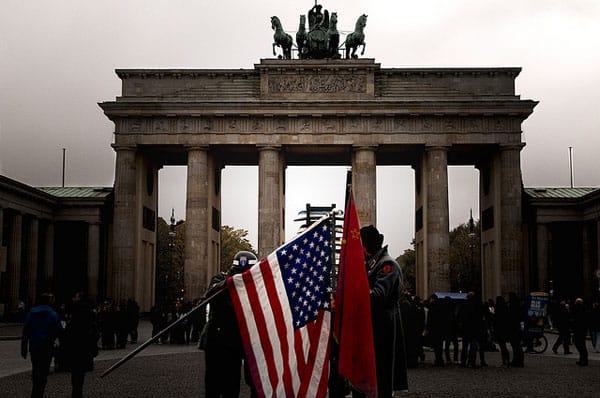
Some in Russia maintain that the West promised there would be no NATO expansion eastwards, even towards what was soon to be the former German Democratic Republic (GDR), in exchange for accepting German unification. The West, particularly the US, maintains there was no such commitment. Which is true? It matters, as it has to do with what is happening in the Ukraine. Since the fall of the Berlin Wall, whose 25th anniversary is coming up this November, NATO has added 12 new Member States, many of them previously in the Warsaw Pact, in three successive batches and a still pending invitation to Georgia and the Ukraine, as well to Montenegro, among others.
This is a task for historians but with political consequences in the present. We should be grateful to Mary Elise Sarott, professor of History at the University of Southern California, for her research, summarised in an informed article in Foreign Affairs –‘A broken promise?– which contradicts some of the statements made by some US officials and experts. If there were agreements, they were never in writing, and it is only now that the evidence is coming to light thanks to newly accessible documents on notes on conservations.
Gorbachev very early on tackled the issue of NATO expansion (or, rather, non-expansion). Indeed, as early as February 1990, when the US Secretary of State James Baker and, soon after, the German chancellor Helmut Kohl travelled to Moscow. Before that, Germany’s Foreign Minister Hans-Dietrich Genscher suggested to his British colleague Douglas Hurd that it should be publicly declared that ‘NATO does not intend to expand its territory to the East’. Baker put to Gorbachev the idea of a unified Germany in NATO, but in a NATO whose jurisdiction would not extend to the former GDR. Baker appeared to have convinced Gorbachev that was it was better to have Germany in NATO rather than going it alone and the Soviet President seemed to accept the idea because he gave the green light to begin the unification process. This also meant that there would not be any further NATO expansion. Gorbachev was very firm to Baker: ‘Certainly any extension of the zone of NATO would be unacceptable’.
But in Washington the National Security Council articulated another line as it considered that it would not be viable to have a unified Germany that would at the same time be within and without NATO. Baker eventually bowed to this line and Bush persuaded Kohl to adopt it. At the same time, Gorbachev came to propose a pan-European security structure, including Russia’s entry in NATO. Baker considered such a pan-European idea an unattainable pipedream.
As time progressed, Gorbachev came under increasing internal pressure in a Soviet Union –whose State and society were both rapidly decaying– that was badly in need of money that Germany could provide, both for relocating the Soviet military set to leave Germany (he furthermore gained a further four years in which to do so) and for loans. In exchange, Gorbachev accepted what at first had seemed unacceptable, German unification on 3 October 1990, less than a year after the fall of the Berlin Wall, and its full integration in NATO. It was a complete diplomatic success for the West.
Gorbachev’s version, as published in his Memoirs, is fairly coincident with Sarrot’s conclusions. He quotes Baker offering that ‘neither the jurisdiction nor NATO troops would expand to territory East of the current limits of the Alliance’. The Soviet leader adds that he was not then ready for the political-military solution that Washington and the Kohl government were proposing for Germany and that, ‘in any case, an extension of NATO territory would be unacceptable’. Gorbachev acknowledged that at the ‘Two Plus Four’ conference in early May, the USSR’s was the only government to insist on German neutrality, on which he finally gave up.
The issue of NATO expansion faded into the background as the primary focus became the first Gulf War following Saddam Hussein’s invasion of Kuwait in the summer of 1991 and the subsequent implosion of the Soviet Union. Finally, after Bush’s surprise defeat by Bill Clinton, the arrival of a new Administration in Washington led to a change in policy. Clinton pushed for the expansion of NATO, as fervently desired by the candidate countries.
Things were both promised and ‘unpromised’, but never formally. They were none too clear verbal agreements. And it seems that Gorbachev did come to accept the permanence of NATO and of US forces in Europe. In writing, as noted above, there is the so-called Russia-NATO Founding Act of 1997, prior to the entry of the Alliance’s new members from 1999 onwards, by which the Western allies agreed not to permanently deploy combat troops in former Warsaw-Pact territory unless circumstances were to change. To the disappointment of some of the Alliance’s members, there will be no permanent deployments in the new Member States. The new Very High Readiness Joint Task Force of 4,000 men and women decided upon at the NATO summit in Wales will be deployed on a rotational basis, not permanently, much the same as other land, sea and air units already in the Alliance’s eastern reaches. But this is as close as it goes. The aim is essentially to reassure allies –not alarm others– that the idea of collective defence still applies.
Sarott ends her article by noting that Russia was kept at the periphery of post-Cold-War Europe ‘by design’. This was probably a strategic error. She further draws attention to a young KGB officer then serving in East Berlin and who returned to Moscow in 1989, resentfully considering that ‘the Soviet Union has lost its position in Europe’. His name was Vladimir Putin.


